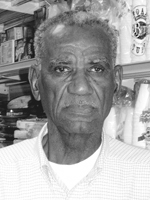Manning Jackson – a living cricket legend

If ever there is a local Cricket Hall of Fame, the name Owen Manning Jackson must be on its walls as one of nation’s cricketing greats.
Manning Jackson formerly played for both St. Vincent and the Grenadines and the Windwards/Leewards teams. But his introduction to hardball cricket was as sudden and dramatic as his exit from the game at the national and regional levels.{{more}}
Jackson is the son of a former national cricketer, also named Owen Jackson, who the younger laments having never seen him play since his father died two years after Manning was born.
Jackson credits his debut in competitive cricket to Noel Baynes. He explained how one Sunday afternoon he was playing cricket in his village, Edinboro, when Baynes observed him batting.
“He told me he wanted me to play cricket in town with him. I asked him what was the match fee and he said two dollars. I wasn’t working at the time. I went and told Mrs. Jack and she told me she would give me two dollars at the end of the month.”
Jackson recalled playing on a matting wicket for the first time in the Fraser Neckles Competition, two weeks after Baynes’ approach.
“They sent me to open. I batted for a half hour, then Randolph ‘Bricks’ Wilson bowled me for two runs. I went back again and was bowled out for two runs.”
Jackson spoke of his encounter with Frank O. Mason, captain of the team called Malverns, when Jackson batted in fourth position.
“The thing of my life, I had to meet Mason for the first time. I was very fearful. In those days the Park wasn’t enclosed. He ran up to bowl but I stood up. When he bowled the first ball, I played it so I kept on batting until I made 69 runs not out.”
Jackson was selected to the national team in 1950 after a brilliant performance against the Grammar School team in a school tournament.
“I actually bowled out the team. I got eight wickets for 29 runs – not a lbw, none caught, and all were bowled, clean bowled. I made 35 runs against them. That’s how I got on the St. Vincent team that year with Eldon Bramble.”
Jackson’s debut, however, was not as impressive, as he was caught behind for zero in a match against St. Lucia. In 1951 he also failed to impress with the bat. Two years later, he was dropped from the team.
“I was a very good bowler, not a very good batsman,” he explained.
Following his recall to the national team, Jackson’s performance improved and he played for the national team until an incident caused him to retire in 1963.
Jackson remembers the 1962 tournament as his best year.
“My best tournament was here in 1962 when we played against Dominica. Cecil Shillingford got 100 â against us. St. Vincent went in and we were 5 for 47. I was number six batsman. I went in and batted through and made 63 not out that day. Garnet Niles made 47 and Robert Mc Cauley made 35. We made 200 and saved the follow-on. Then Mason (Frank) came in the second innings and bowled out Dominica for 32, giving us 144 to win. We won that tournament.”
But, success at the national and regional levels was achieved under very rough conditions. For Jackson and others, money was a scare commodity.
“In 1956 we went to Dominica. I used to work then with the government cotton ginnery. Money was limited those days. Sometimes I had only $50. That year I was selected for Windward Islands. I was also selected for Windwards/Leewards. Eldon Bramble and myself had not a penny; we were broke.
âWe had a month in Dominica. We went to the president of the Windward Island Board, Molly Frampton. They said they did not have any money. We were in Dominica for weeks without anything at all, just depending on the hotel to get something to eat.”
Comparing cricket over a 50-year period, Jackson believes that if he had the opportunities then, he would have been a better player.
“Guys have it real nice now, but, they are playing the fool. I never got a cent to play cricket. We stayed weeks walking up and down Dominica.
âThe cricket I am seeing today, if I had seen that kind of cricket in my day I would have been a better player. The guys today are not making use of it.”
Jackson’s departure from the national cricket team came abruptly in 1963 when he retired after the team lost the tournament to Grenada in the match played on that island.
“After we lost, Eldon Bramble, Arthon Clouden, Grenville Codougan and myself went to Grand Anse to bathe. When we came back [to the hotel] in the afternoon, we were told Mr. Brisbane said we must come home. I asked him if it was true and he said yes, or we would be responsible for ourselves. The others said they were not coming. They stayed with a police officer in Grenada.
“I came home and I wrote my resignation and I told them that’s it.”
Jackson said from that day he never played cricket at that level again.
Today Manning Owen Jackson is employed at C. K. Greaves supermarket in Kingstown.









